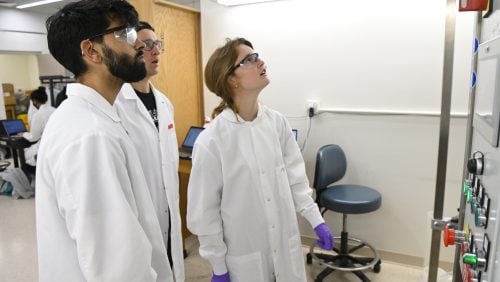The Department of Chemical and Biomolecular Engineering’s undergraduate program provides a diverse and supportive environment, focused on educating innovative and fundamentally-grounded engineers.
By fusing core chemical engineering principles with emerging disciplines, our undergraduates innovate new technologies and spur cross-disciplinary scientific discovery.
With the option to concentrate in Molecular and Cellular Bioengineering or Interfaces and Nanotechnology, students can tailor their studies to suit their interests, contribute to the creation of knowledge through unparalleled research opportunities, and graduate with the skills, knowledge, and experiences they need to pursue their professional goals, no matter what path they may choose.
Our graduates take a myriad paths–working in the pharmaceutical and energy industries and finance, launching their own startups, or pursuing further studies in a variety of engineering fields, as well as in medicine, law, and business.
Questions about our undergraduate academic programs?
Director of Undergraduate Studies, Lilian Lam Josephson
Undergraduate Academic Program Administrator, Drew Sonnenberg
The undergraduate curriculum in Chemical and Biomolecular Engineering includes options for different tracks of study and provides students with foundational knowledge in biology, chemistry, physics, and mathematics.
Our academic offerings are strengthened through research experiences that enable students to work closely with renowned engineers and scientists–at the School of Engineering, as well as with faculty and researchers at Johns Hopkins’ schools of Medicine and Applied Physics Laboratory. Undergraduates also benefit from our faculty members’ affiliations with major centers and institutes, such as the Institute for NanoBioTechnology, where students contribute to research advances in fields ranging from drug delivery and nanotechnology to alternative energy and cancer research.
The curriculum in Chemical and Biomolecular Engineering is designed to be completed in four years, and students who plan carefully and/or use Advanced Placement credits can have the flexibility to pursue double majors and/or minors, study abroad, and tailor their studies to their interests and needs.
Tracks of Study
Undergraduates can develop more in-depth expertise by selecting to specialize in one of the following areas in chemical and biomolecular engineering:
- Molecular and Cellular Bioengineering (MCB)
- Interfaces and Nanotechnology (IN)
- Data Science and Machine Learning (DSML)
Advising Manuals
Beginning Fall 2024, we are phasing out the Undergraduate Advising Manual. The academic requirements and sample programs can be found in the e-Catalogue.
View Undergraduate Advising Manuals for students entering 2018 – 2023
- Students Entering 2023
- Students Entering 2022
- Students Entering 2021
- Students Entering 2020
- Students Entering 2019
- Students Entering 2018
More information for current undergraduates including degree checklists and forms, can be found here.
Learn about the admissions process.
“Hopkins can feel large sometimes. Being in a midsize department like ChemBE means being surrounded by students and faculty driven in equal parts to excel in their own endeavors and to help you succeed. From going on walks with professors for office hours to finding my research mentor while playing basketball at the rec, ChemBE has sufficiently shaped my experience here. ”
 Manas Joshi
Class of 2026
Manas Joshi
Class of 2026
“I’m a current ChemBE freshman, and I’ve already experienced so much in Hopkins, as I truly love to stay productive and partake in self care for my future. I’ve already joined a ChemBE research lab, obtained an internship on campus, joined numerous student organizations, and still pursue my musical passions. ”
 John Cintron
Class of 2027
John Cintron
Class of 2027
A Hands-on Approach to Learning
Baltimore is Home - We’re a city rich in history and culture, filled with great restaurants and affordable housing, and because we’re close to so many global companies, career, internship, and research opportunities abound. Baltimore is home.

ChemBE undergrads clean up at AIChE conference - The annual student conference for the American Institute of Chemical Engineers was held in Orlando recently, and JHU’s undergrad cohort took home some awards.
Opportunities Abound
Our students graduate prepared to lead.
Through academic concentrations, electives, entering the concurrent BS/MS program, research activities, career networking, and internships, as well as through the support and mentorship of our faculty, Chemical and Biomolecular Engineering undergraduates have ample opportunity to explore their interests and define their professional goals--along with strategies to achieve them.
